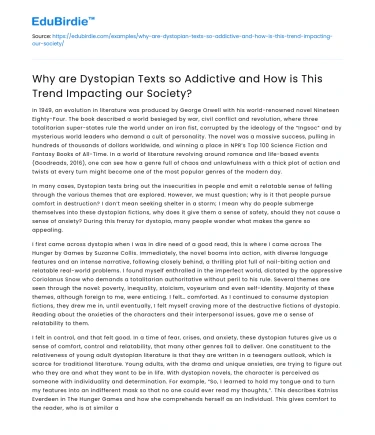In 1949, an evolution in literature was produced by George Orwell with his world-renowned novel Nineteen Eighty-Four. The book described a world besieged by war, civil conflict and revolution, where three totalitarian super-states rule the world under an iron fist, corrupted by the ideology of the “Ingsoc” and by mysterious world leaders who demand a cult of personality. The novel was a massive success, pulling in hundreds of thousands of dollars worldwide, and winning a place in NPR’s Top 100 Science Fiction and Fantasy Books of All-Time. In a world of literature revolving around romance and life-based events (Goodreads, 2016), one can see how a genre full of chaos and unlawfulness with a thick plot of action and twists at every turn might become one of the most popular genres of the modern day.
In many cases, Dystopian texts bring out the insecurities in people and emit a relatable sense of felling through the various themes that are explored. However, we must question; why is it that people pursue comfort in destruction? I don’t mean seeking shelter in a storm; I mean why do people submerge themselves into these dystopian fictions, why does it give them a sense of safety, should they not cause a sense of anxiety? During this frenzy for dystopia, many people wonder what makes the genre so appealing.
Save your time!
We can take care of your essay
- Proper editing and formatting
- Free revision, title page, and bibliography
- Flexible prices and money-back guarantee
I first came across dystopia when I was in dire need of a good read, this is where I came across The Hunger by Games by Suzanne Collis. Immediately, the novel booms into action, with diverse language features and an intense narrative, following closely behind, a thrilling plot full of nail-biting action and relatable real-world problems. I found myself enthralled in the imperfect world, dictated by the oppressive Coriolanus Snow who demands a totalitarian authoritative without peril to his rule. Several themes are seen through the novel: poverty, inequality, stoicism, voyeurism and even self-identity. Majority of these themes, although foreign to me, were enticing. I felt… comforted. As I continued to consume dystopian fictions, they drew me in, until eventually, I felt myself craving more of the destructive fictions of dystopia. Reading about the anxieties of the characters and their interpersonal issues, gave me a sense of relatability to them.
I felt in control, and that felt good. In a time of fear, crises, and anxiety, these dystopian futures give us a sense of comfort, control and relatability, that many other genres fail to deliver. One constituent to the relativeness of young adult dystopian literature is that they are written in a teenagers outlook, which is scarce for traditional literature. Young adults, with the drama and unique anxieties, are trying to figure out who they are and what they want to be in life. With dystopian novels, the character is perceived as someone with individuality and determination. For example, “So, I learned to hold my tongue and to turn my features into an indifferent mask so that no one could ever read my thoughts,”. This describes Katniss Everdeen in The Hunger Games and how she comprehends herself as an individual. This gives comfort to the reader, who is at similar age to the protagonist of the story. They appreciate how the author shows the protagonists uncertainties and anxieties such as their love interests and body image. The readers, especially in young adult dystopian literature, can take themselves to an alternate universe in which the character lives and feels like they are in the story. This notion makes it simple for them to relate to the protagonist.
With the increasing popularity of dystopian novels that was just recently discussed, several questions arise. Of the most important; does increasing consumption of dystopian narratives influence people’s perspectives about the world? According to a study conducted by the Washington Post in 2019, which utilised three computer-based experiments to rigorously test hypotheses about the effects of dystopian fiction on people’s attitudes, it was certain that dystopian fiction makes people more willing to justify political violence. It was paramount in the study that despite dystopian fiction being “make-believe”, the texts heightened peoples willingness to justify radical – and especially violent – forms of political action against injustice by political elites (Jones, 2019). In the first experiment, it only took a small stimuli to a totalitarian-based dystopian fiction to make people say that violent protest and armed rebellion could be justifiable (compared with those who consumed no media) (Jones, 2019). Subjects who were exposed to a dystopian text, were also more likely to agree that violence was sometimes necessary to obtain justice, especially when compared to the no-media group. From these experiments, we can justify that dystopian fictions have a significant effect on what people thought was ethically acceptable. Clearly, the fictions of dystopia influence our society into more violent and rebellious afterthoughts, especially in relation to totalitarianism.






 Stuck on your essay?
Stuck on your essay?

